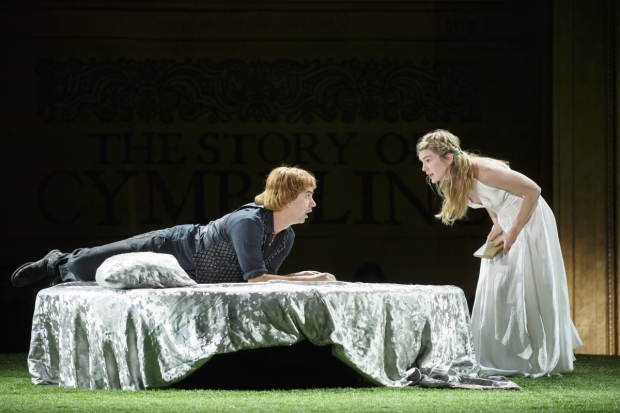
(© Carol Rosegg)
In the past four hundred years, the plays of William Shakespeare have taken on an almost holy significance. Purists and auteurs endlessly debate the hidden meaning in the text as if they were wizened rabbis discussing the Talmud. Meanwhile, the casual reader has learned to fear the Bard — so much so that a series of "No Fear" versions of the plays, written in the vernacular, have become bestsellers. As is abundantly apparent in the riotous Shakespeare in the Park mounting of Cymbeline, however, the playwright did not share this sentiment about his own work. Nor did legendary theater critic Harold Bloom, who once wrote, "Cymbeline seems to me an extravagant self-parody, in which Shakespeare recalls earlier triumphs largely to mock them." Director Daniel Sullivan has taken this interpretation to heart, lampooning all things Shakespearean in one of the most joyous productions to play the Delacorte in years.
Cymbeline's plot is audaciously convoluted, even for Shakespeare. Imogen (Lily Rabe) is the daughter of Cymbeline (Patrick Page), King of ancient Britain. Since her brothers Guiderius (David Furr) and Arviragus (Jacob Ming-Trent) were kidnapped by the renegade nobleman Belarius (Kate Burton), Imogen's future husband stands to inherit the throne. This proves to be a problem when she secretly marries Posthumus Leonatus (Hamish Linklater), a poor but worthy gentleman. Cymbeline had promised Imogen to Cloten (also Linklater), the oafish son of his evil second wife (also Burton), so he's obviously peeved. Leonatus flees to Italy where he makes a most ungentlemanly wager with the wily Italian gambler Iachimo (Raúl Esparza) concerning Imogen's chastity. At the same time, Roman Ambassador Caius Lucius (Teagle F. Bougere) threatens to invade Britain if Cymbeline does not pay tribute. Trickery and mistaken identity reign as war with Caesar looms.
There's a lot going on, right? Drag, shifty Italians, a wicked queen, long-lost royalty, that special kind of poison that doesn't kill you yet makes you seem dead: All of the Bard's greatest clichés make an appearance. Sullivan stews this Shakespearean rock soup to a healthy boil, adding in a few clichés of his own. Whether in his Edwardian All's Well That Ends Well (2011) or his early-19th-century Twelfth Night (2009), Sullivan has a knack for setting Shakespeare's plays in an unlikely time and place as a means of illuminating the text while simultaneously offering a shimmering visual feast. Cymbeline feels like a mad compendium of all his previous efforts.
Riccardo Hernandez has designed a messy attic of a set. Crates labeled "Hamlet," "Othello," and "King Lear" pile onstage while chandeliers, gaudy neoclassical sculptures, and gramophones spill out. The playing space is flanked by huge cutouts: a World War I tank stage left, David's painting of Napoleon crossing the Alps stage right. It's a dramaturgical train wreck. Ranging from Disney villainess to drum major, David Zinn's costumes are similarly hard to pin down. Tom Kitt brilliantly sets Shakespeare's words to a musical pastiche encompassing swinging rat-pack standards, folk, and cheesy '60s pop. It all sounds and looks great, but what era is it? Actually, that doesn't really matter.
The actors navigate this jumbled world with unwavering commitment. Linklater gives a thrilling double performance as Posthumus and Cloten, milking Shakespeare's bawdy language for all it's worth. Page's King is as majestic as he is clueless. Burton makes us laugh no matter if she's playing a man or a woman. Esparza's swagger is topped only by his idiosyncratic creepiness. He truly makes us feel complicit as voyeurs in his disturbing bedroom scene with Imogen.
Oh, poor Imogen. She comes in for so much abuse in this play. Really, the only way to mount this show in 2015 without it capsizing under the oppressive weight of its gleeful patriarchy is as a comedy. Playing "the truest princess that ever swore her faith," Rabe rises valiantly to the task. She offers an interpretation of the verse that is second to none in terms of clarity and sheer emotional connection. The look of exasperation on her face says it all: Imogen is trapped in a world ruled by idiotic, vainglorious perverts.
Their sleazy and foolish characters aside, this is one of the most richly voiced casts in recent memory. One could listen to them read aloud from the phone book and never grow bored, so hearing them recite Shakespeare is an unparalleled treat.
Sullivan makes a strong argument for Shakespeare as a pioneer of metatheater, a decidedly not precious author who wrote plays (emphasis on the play). You can't help but laugh at the absurdly long resolution scene, in which the playwright ties up no fewer than 27 loose plot points. A rollicking jig follows, leading the whole theater to clap along. This kind of irreverent fun is what Shakespeare in the Park is all about.









